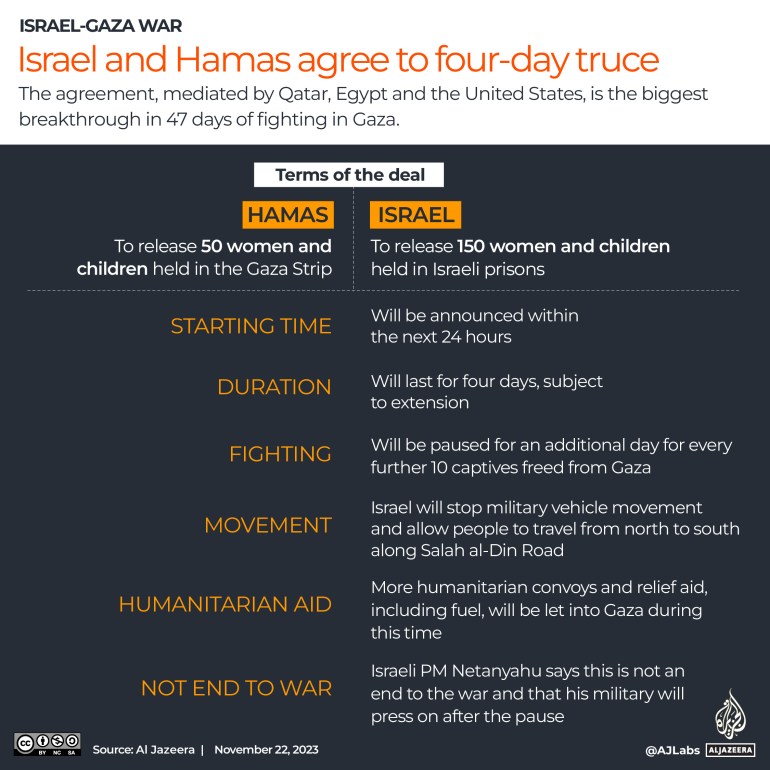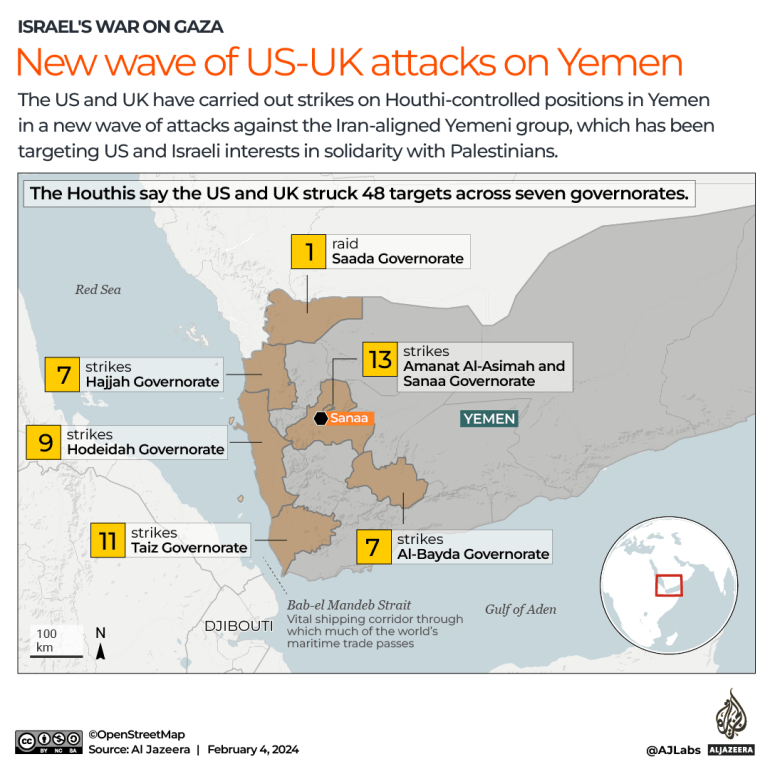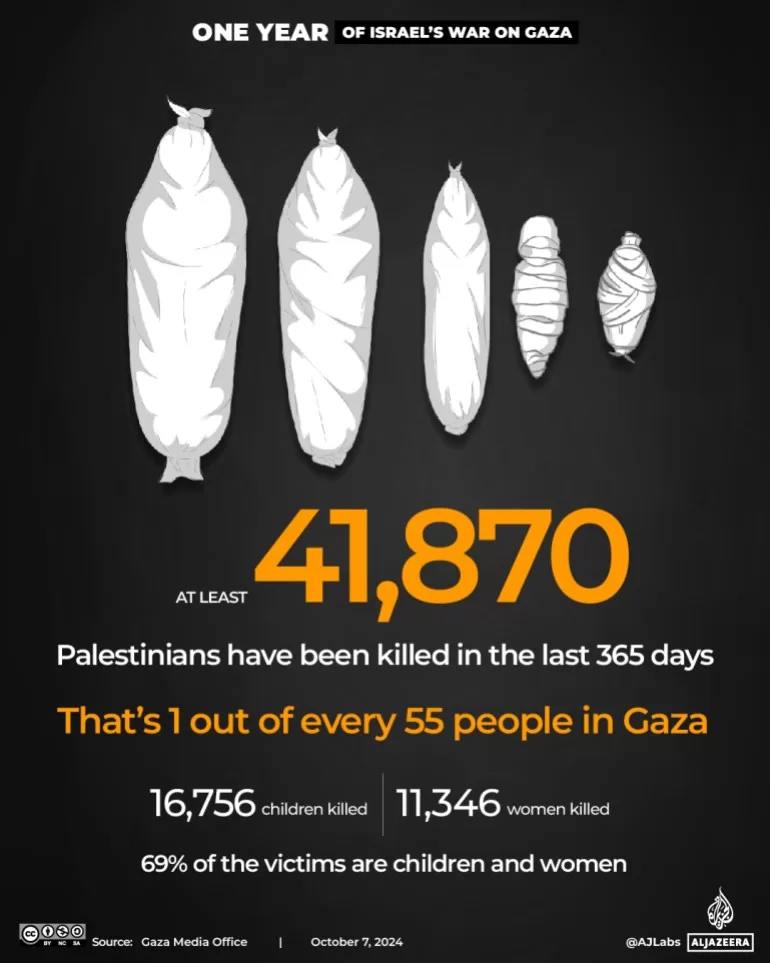For a full year, horrific scenes have come out of Gaza as Israel’s war on civilians in the besieged enclave continues.
The war began on the same day as and in alleged retaliation for an offensive on southern Israel launched by Hamas’s armed wing and other Palestinian resistance groups.
Israel has killed more women and children in Gaza over the past year than in any other conflict in the past two decades, Oxfam found last week.
In March, the United Nations said Israel had killed more children there in the preceding months than in four years of conflict worldwide.
Despite being called out on its atrocities, Israel has widened its war, attacking Lebanon and bombing Syria and Yemen.
Here’s a look back at 10 key moments of the past year:
October 7, 2023 – Hamas’s operation in Israel
Fighters aligned with Hamas and other Palestinian resistance groups broke through the barrier around the Gaza Strip for an operation in Israel, killing 1,139 people and capturing about 250.
Prime Minister Benjamin Netanyahu and Israel’s intelligence community seemed humiliated.
Traumatised Israelis rallied behind the government to support retribution on the entire population of Gaza, hoping to retrieve the captives.
One year later, Israel has killed at least 41,870 people in Gaza, though the actual figure is presumed much higher. Thousands more are buried under the rubble of destroyed buildings or unaccounted for, and still thousands of others are likely to die from continuing bombing and conditions created by Israel’s war.
October 7, 2023 – Israel’s retaliation
In the afternoon, Israel responded by hitting Gaza with air attacks. A few hundred were killed in the first hours as Israel claimed it would “eradicate Hamas”.
The war on every human being in Gaza has continued since then.
October 8, 2023 – Hezbollah joins the fight
After 24 hours, Hezbollah began launching rockets, announcing its support of the people of Gaza and that it would stop when a ceasefire was announced.
It first hit Shebaa Farms, an area historically disputed between Syria and Lebanon but currently occupied by Israel.
For 11 months, Hezbollah and some of its allies fired rockets, predominantly at Israeli military sites.
For every rocket launched from Lebanon, Israel responded with at least five.
Tens of thousands were displaced from each side of the border.
Much of Lebanon’s south was destroyed in what experts say was an attempt to create a buffer zone.

October 17, 2023 – Al-Ahli Hospital
A huge blast in Gaza’s al-Ahli Arab Hospital – which was packed with displaced Palestinians – killed nearly 500 people.
Many of those killed were sheltering from relentless Israeli bombing.
Gaza’s Health Ministry said an Israeli air raid caused the blast.
Israel said it was a misfired rocket launched by the Palestinian Islamic Jihad (PIJ) armed group.
An Al Jazeera investigation found that Israel seemed to have misinterpreted evidence to build a story that exonerated it.
This blast would be the tip of the iceberg: Israel continued, attacking Gaza’s healthcare facilities and workers over the coming year.
Most of Gaza’s hospitals no longer function, and its healthcare system has been reeling for months.

November 19, 2023 – The Houthis’ first attack
The Houthis, Hamas allies who control parts of Yemen including its capital Sanaa, launched their first attack in the Red Sea on November 19.
They hijacked a cargo ship, the Galaxy Leader, reportedly partly owned by an Israeli businessman.
Some 25 people were on board and have since been held as captives by the Houthis.
Houthi military spokesperson Yahya Saree said the seizure was a response to the “heinous acts against our Palestinian brothers in Gaza and the West Bank”.
Capturing the Galaxy Leader started a Houthi campaign of missile and drone attacks against shipping.
The Houthis have since launched about 130 attacks on what they say are Israeli-linked vessels in one of the world’s most important trade routes.

November 24 to December 1, 2023 – Temporary ceasefire
In a year of war on Gaza, there has been one pause in fighting – a four-day ceasefire mediated by Qatar which was renewed twice and held from November 24 to December 1.
Fighting paused and humanitarian aid was allowed to enter Gaza as Hamas released captives in exchange for Israel releasing Palestinian prisoners.
Hamas agreed to release 50 women and children out of the 237 October 7 captives.
Meanwhile, Israel agreed to release 150 Palestinian women and children from its prisons.
After seven days, the truce ultimately expired. Ceasefire talks have since been in an impasse.
The UN humanitarian office, OCHA, reported that despite the truce, Israeli forces shot and killed two Palestinians in Gaza on November 29 and shelled people on November 30.

January 12, 2024 – Yemen air attacks
On January 12, 2024, United States and British warplanes began bombing Yemen in response to the Houthis’ attacks on Red Sea traffic.
While five fighters were reportedly killed, the attacks failed to stop the Houthis’ military activities against vessels in the Red Sea.
The Houthis’ claim of their attacks being in support of the people of Gaza has turned out to be incredibly popular in Yemen, as the group has reportedly recruited and trained about 200,000 new fighters since October 2023.

May 6, 2024 – Invading Rafah
Before this invasion, Rafah was an important refuge for some 1.4 million Palestinians huddled there, fleeing Israeli bombardment.
Despite its density, Israel had been threatening its invasion for months, ignoring the international community that viewed it as a “red line”.
Israel invaded Rafah on May 6, defying international opinion and promising a “limited” operation against Hamas fighters. However, months later, the southern Gaza city remains under attack.
The offensive also shut Rafah’s border crossing with Egypt, an important point of entry for aid and also the point of exit for those fleeing the war.
In the last week of May, the International Court of Justice (ICJ) ordered Israel to “immediately” halt its military assault on Rafah, but that did not happen.

July 13, 2024 – The al-Mawasi massacre
Israel killed at least 90 Palestinians and wounded hundreds in attacks on al-Mawasi, west of Khan Younis.
Israeli warplanes targeted displaced people’s tents and a water distillation unit in an area that a Gaza civil defence spokesperson said Israel had designated a “safe zone”.
The attack was one of many massacres Israel committed in Gaza in the last year. Others were:
September 17, 2024 – Day of death in Lebanon, official widening of the war
On this day, thousands of pagers exploded in Lebanon. A day later, thousands of walkie-talkie radios also exploded.
These attacks – blamed on Israel – killed hundreds.
On September 23, Israel attacked Lebanon directly, in the south, the Bekaa Valley in the east, and Beirut’s southern suburb of Dahiyeh, killing at least 550 people.
Then on September 27, Hezbollah’s Secretary-General Hassan Nasrallah was assassinated in an attack on Dahiyeh so big it flattened several apartment buildings.
Israel reportedly used 80 bombs, killing at least six people and wounding 90.
Nasrallah’s assassination was quickly followed by Israeli demands that people leave large swaths of Dahiyeh.
Lebanon’s government now says as many as 1.2 million people may be displaced.
Israel has killed more than 2,000 people in Lebanon since the start of its war on Gaza, according to Lebanon’s Health Ministry.
It killed most of them in the last three weeks.

